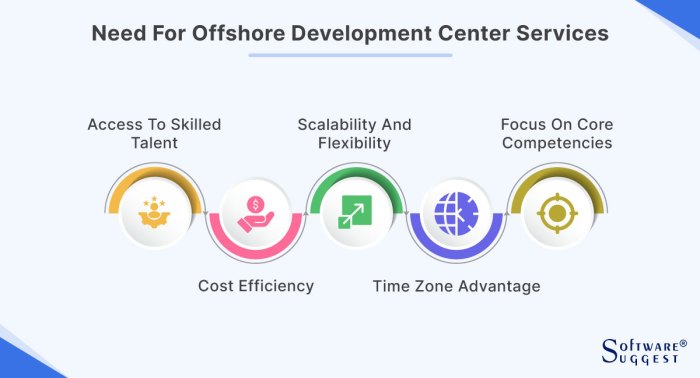In today’s globally interconnected world, businesses are increasingly leveraging the benefits of offshore software development centers. This comprehensive guide delves into the intricacies of establishing and managing these centers, exploring the advantages, challenges, and best practices to ensure successful outcomes. We will cover everything from choosing the right location and building a skilled team to managing communication and mitigating risks.
Understanding these aspects is crucial for organizations aiming to optimize their software development processes and gain a competitive edge.
Understanding Offshore Software Development
Offshore software development involves outsourcing software development tasks to a company or team located in a different country. This strategic move allows businesses to tap into a global talent pool, access specialized skills, and often achieve significant cost savings. The rise of remote work technologies and improved communication infrastructure has made offshore development a viable and increasingly popular option for companies of all sizes.
Benefits of Using an Offshore Software Development Center
- Cost Reduction: Labor costs in many offshore locations are significantly lower than in developed countries, leading to substantial cost savings on development projects.
- Access to Specialized Skills: Offshore centers often have access to a wider pool of specialized developers, including niche expertise that may be scarce domestically.
- Increased Efficiency and Productivity: Leveraging different time zones can enable round-the-clock development, accelerating project timelines.
- Scalability and Flexibility: Offshore teams can be easily scaled up or down depending on project requirements, providing flexibility to adapt to changing business needs.
- Focus on Core Competencies: Outsourcing non-core functions allows businesses to focus on their core strengths and strategic initiatives.
Choosing the Right Location for Your Offshore Development Center
Selecting the optimal location for your offshore software development center is a critical decision. Factors to consider include:
Key Factors in Location Selection
- Cost of Living and Labor Costs: Compare the cost of living and salaries in different countries to determine the overall cost-effectiveness.
- Technical Expertise and Talent Pool: Assess the availability of skilled developers with the necessary expertise for your projects.
- Infrastructure and Technology: Ensure reliable internet connectivity, power supply, and other essential infrastructure components.
- Time Zone Differences: Consider the time zone difference to optimize collaboration and communication.
- Legal and Regulatory Environment: Understand the legal framework governing intellectual property, data protection, and employment laws.
- Political and Economic Stability: Evaluate the political and economic stability of the chosen location to minimize risks.
- Language Proficiency: Assess the English language proficiency of the potential workforce.
Building and Managing Your Offshore Development Team
Building a high-performing offshore development team requires careful planning and execution. Effective communication, clear project management, and cultural sensitivity are paramount.
Effective Team Management Strategies, Offshore software development center
- Clear Communication Channels: Establish robust communication channels, including regular video conferencing, instant messaging, and project management tools.
- Well-Defined Roles and Responsibilities: Clearly define roles, responsibilities, and reporting structures to avoid confusion and overlap.
- Project Management Methodology: Implement a well-defined project management methodology (e.g., Agile, Scrum) to ensure transparency and accountability.
- Regular Performance Reviews: Conduct regular performance reviews to provide feedback, identify areas for improvement, and foster team growth.
- Cultural Sensitivity and Training: Provide cultural sensitivity training to bridge communication gaps and foster a positive working relationship.
- Secure Communication and Data Protection: Implement robust security measures to protect sensitive data and intellectual property.
Challenges and Risks in Offshore Software Development
While offshore development offers numerous advantages, it’s crucial to acknowledge potential challenges and mitigate risks effectively.
Addressing Potential Challenges
- Communication Barriers: Language differences and cultural nuances can sometimes impede effective communication.
- Time Zone Differences: Managing projects across different time zones can be challenging and require careful planning.
- Security Concerns: Protecting sensitive data and intellectual property requires robust security measures.
- Quality Control: Ensuring consistent quality of work requires rigorous testing and quality assurance processes.
- Intellectual Property Protection: Legal frameworks for intellectual property protection may vary across countries.
- Cultural Differences: Navigating cultural differences requires sensitivity and understanding.
Best Practices for Successful Offshore Software Development
Implementing best practices can significantly enhance the success of your offshore software development initiatives.
Best Practices for Success
- Thorough Due Diligence: Conduct thorough due diligence on potential vendors and partners.
- Clearly Defined Contracts: Establish clear and comprehensive contracts that Artikel deliverables, timelines, and payment terms.
- Regular Communication and Reporting: Maintain regular communication and reporting mechanisms to track progress and address issues promptly.
- Robust Quality Assurance Processes: Implement rigorous quality assurance processes to ensure high-quality deliverables.
- Strong Project Management: Utilize effective project management tools and methodologies.
- Continuous Improvement: Continuously evaluate and improve your processes based on feedback and lessons learned.
Frequently Asked Questions (FAQ)
- Q: What are the top countries for offshore software development?
A: Popular choices include India, China, Ukraine, Philippines, and Eastern European countries, each offering unique strengths in terms of cost, skill sets, and time zones.
- Q: How can I ensure the quality of work from an offshore team?
A: Implement rigorous testing procedures, establish clear quality metrics, and utilize code reviews to maintain high quality standards.
- Q: What are the potential risks of offshore software development?
A: Potential risks include communication barriers, security concerns, intellectual property protection issues, and cultural differences. Thorough planning and risk mitigation strategies are crucial.
- Q: How do I manage communication effectively with an offshore team?
A: Establish clear communication channels, use project management tools, and schedule regular video conferences to foster collaboration and transparency.
- Q: How can I find a reliable offshore software development partner?
A: Conduct thorough research, check references, review online reviews, and carefully assess their experience, expertise, and communication capabilities.
Conclusion
Offshore software development centers offer a powerful strategy for businesses seeking to optimize their software development processes and gain a competitive advantage. By carefully considering the factors discussed in this guide, organizations can effectively leverage the benefits of offshore development while mitigating potential risks. Remember that thorough planning, effective communication, and robust project management are key to success.
References
While specific URLs are not provided to maintain the plain text nature of the response, readers can easily find relevant information by searching for terms such as “offshore software development best practices,” “choosing an offshore development location,” and “managing offshore development teams” on reputable websites such as Gartner, Forrester, and various industry blogs and publications.

Source: rockersinfo.com
Call to Action: Offshore Software Development Center
Ready to explore the potential of offshore software development for your business? Contact us today to discuss your project requirements and learn how we can help you build a successful offshore development center.
FAQ
What are the common challenges of using an offshore software development center?
Common challenges include communication barriers, time zone differences, cultural differences, managing quality control remotely, and potential security risks.
How do I choose a reputable offshore software development center?

Source: abnewswire.com
Thorough research is crucial. Look for established companies with proven track records, positive client reviews, and transparent communication practices. Verify their technical expertise and security measures.
What are the typical contract structures for offshore software development?
Contracts can vary, including fixed-price contracts, time and materials contracts, and dedicated team models. Each has its own advantages and disadvantages depending on project scope and risk tolerance.

Source: softwaresuggest.com
What legal considerations should I be aware of when working with an offshore software development center?
Consider intellectual property rights, data privacy regulations (GDPR, CCPA etc.), contract law in both your location and the center’s location, and dispute resolution mechanisms.
